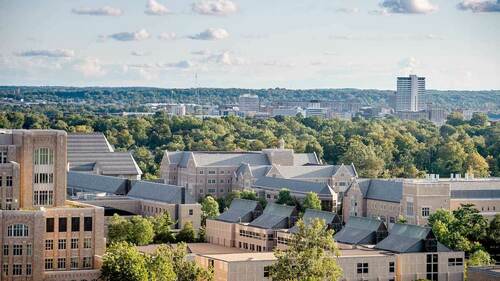
What is the current housing situation in South Bend? Who rents, and why? Who buys? Where is housing cheap? Where is it expensive?
To answer these questions, the city of South Bend turned to the MetroLab Network, a city-university collaborative for civic innovation, and to its partner in the network: the University of Notre Dame.
Over the course of the spring semester, graduate students in the Department of Applied and Computational Mathematics and Statistics (ACMS) analyzed social, demographic, economic and housing data to find commonalities within the data at the census block level.
The students then grouped the blocks into clusters to illustrate similarities and differences in data, and thus in the overlying housing situation, among granular areas of the city and surrounding St. Joseph County.
The result?
A color-coded view of the city and county composed of five distinct clusters of similar census blocks, each spanning multiple, often noncontiguous areas of the city and county.
For example, one cluster, characterized by young, single renters, spans seven distinct areas of the city and county, according to the analysis, from the north side of Mishawaka and suburban Clay Township to the area east of Notre Dame.
Viewed alone, the cluster resembles an archipelago of similar census blocks.
The work was part of a newly established capstone course for students enrolled in the University’s online master’s degree program in ACMS-Data Science, a collaboration with the departments of computer science and engineering and psychology and the Mendoza College of Business as well as AT&T.
“The five different clusters were really distinct,” one of the students, Daniel Malee, said. “One profile had a mean housing price of $240,000 while another had a mean housing price of $80,000, and average income varied widely across the clusters.”
And while some of the results were expected, others were not, said Malee, a technical architect in the cybersecurity group with AT&T in Chicago.
For example, one cluster, which had among the lowest average mortgage costs, also had among the highest average rental costs, Malee said, “so it’s not a very far leap to homeownership.”
Why?
That’s just one of the many questions now as the city — specifically, the departments of innovation and technology and community investment — digs further into the results and looks for links to past and/or current policy.
Of the experience overall, Malee said, “From an academic perspective, it gave us an opportunity to practice a lot of what we learned throughout four previous semesters, and to apply that learning to a real-world problem.”
And that’s the point, according to Roger Woodard, director of the online ACMS-Data Science master’s degree program.
“There are many intricate aspects of the data science process that come out in a capstone project,” said Woodard, who in addition to overseeing the master’s degree program also teaches the capstone course. “Giving our students a chance to see these aspects prepares them for the workforce.”
In addition to examining the effects of past and/or present policy on the current housing situation, the city hopes to use the information to better inform future policymaking around housing, both alone and in collaboration with public and private partners at the local, state and federal levels.
“These clusters are a really helpful tool as the city thinks about what renting versus owning looks like in different geographies, and in understanding the characteristics of renting versus owning in different parts of the region,” said Sonja Karnovsky, business analyst for South Bend’s Department of Innovation and Technology.
Karnovsky added, “I can see this being a really helpful tool as the city looks at rolling out different pilot programs in the future.”
This is just one example of the work to emerge from the capstone course this past semester.
Students also analyzed data for corporate clients, including Advance Auto Parts, as well as the nonprofit Horizon Educational Alliance, a collaboration among education and business leaders in Elkhart County that supports the educational success of all residents.
Regarding the latter, students analyzed survey results for “Manufacturing Day,” an annual event that exposes Elkhart-area students to careers in manufacturing, to measure satisfaction with the program among thousands of middle school-age students.
Now newly graduated from the ACMS program, Malee said he hopes to take what he learned in the program and pivot to a career in data analysis.
“The program was great,” Malee said. “I would highly recommend it, and I have highly recommended it to a lot of my peers.”
For more information, visit acms.nd.edu.
Contact: Erin Blasko, assistant director of media relations, 574-631-4127, eblasko@nd.edu